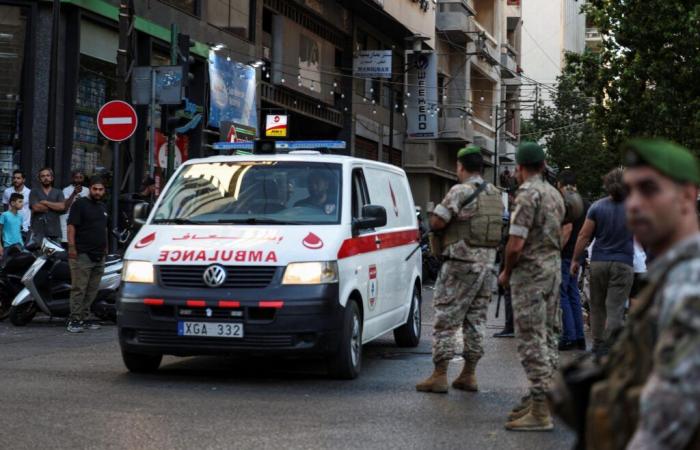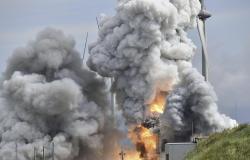The latest toll from the simultaneous explosion of beepers in Lebanon and Syria is nine dead and at least 2,500 injured.
Hundreds of Hezbollah members were injured and eight people were killed Tuesday across Lebanon and Syria when their pagers exploded simultaneously. The Lebanese Islamist movement blamed the “attack” on Israel.
Israel has not commented on the explosions, which occurred in several Hezbollah strongholds hours after the country announced it was expanding the goals of its war against Palestinian Hamas in the Gaza Strip to its northern border with Lebanon.
More after this ad
Since the start of the war in Gaza, triggered on October 7, 2023 by Hamas’ bloody attack on Israel, the border area between Israel and Lebanon has been the scene of almost daily exchanges of fire between the Israeli army and Hezbollah, supported by Iran and allied with Hamas, which have led to the displacement of tens of thousands of civilians on both sides.
More after this ad
A considerable human toll
A Source close to Hezbollah announced on Tuesday that “hundreds of members” of the movement “were injured by the simultaneous explosion of their pagers”, a radio messaging system, in the southern suburbs of Beirut, in southern Lebanon and in the eastern Bekaa plain, in the first incident of its kind in nearly a year.
“Eight people were killed and nearly 2,750 others injured,” Lebanese Health Minister Firass Abiad said.
More after this ad
More after this ad
Hezbollah claimed that Israel was “fully responsible” for the explosions and assured that it would “receive its just punishment” following “this criminal aggression.”
Among the dead was a ten-year-old girl killed in eastern Lebanon when her father’s pager exploded, according to her family and a Source close to Hezbollah, as well as the son of a Hezbollah MP.
Iranian ambassador to Beirut, Mojtaba Amani, was injured, Iranian television reported.
An AFP correspondent in the Bekaa saw wounded people streaming into hospitals. Another in the southern Lebanese city of Saida reported dozens of ambulances arriving at hospitals.
The impact of the explosions on Hezbollah’s communications was not immediately clear.
A supply chain infiltration
The spectacular simultaneous explosion of the pagers of hundreds of Hezbollah members in Lebanon appears to be the result of an infiltration by Israel of the supply chain of the pro-Iranian Islamist movement, a new major success for the Israeli services.
According to a Source close to Hezbollah to AFP, “the pagers (a radio paging system, editor’s note) which exploded concern a shipment recently imported by Hezbollah of a thousand devices”, which appear to have been “hacked at Source”.
“According to the video recordings […]”A small plastic explosive was certainly hidden next to the battery (of the pagers) for remote triggering by sending a message,” estimates Charles Lister, an expert at the Middle East Institute (MEI), on the social network X.
Which means for him that “the Mossad (Israeli foreign secret service, in charge of special operations, Editor’s note) has infiltrated the supply chain.”
Israeli agents probably “infiltrated the production process and added an explosive component and a remotely activated detonator to the beepers, without arousing suspicion,” adds Brussels-based military analyst Elijah Magnier, describing “a major security breach in Hezbollah protocols.”
“Either by posing as a supplier or by injecting the tampered equipment directly into Hezbollah’s supply chain via its vulnerabilities (transport trucks, merchant ships), they were able to spread the beepers within the organization,” said Mike DiMino, a security expert and former CIA analyst.
Another hypothesis, according to Riad Kahwaji, a security analyst based in Dubai, is that “Israel controls a large part of the electronics industries in the world and, without a doubt, one of the factories it owns manufactured and shipped these explosive devices that exploded today.”
US ‘not involved’
The United States has said it was neither involved in nor had advance notice of Tuesday’s explosion of pagers belonging to Hezbollah members in Lebanon, with U.S. diplomacy urging Iran to avoid any action that would further escalate tensions.
“I can tell you that the United States was not involved in this, that the United States was not aware of this incident in advance, and at this point we are gathering information,” State Department spokesman Matthew Miller told reporters.
He declined to comment on the attribution of this attack, the Lebanese Islamist movement designating Israel, ally of the United States and adversary of Hezbollah.
The attack comes after weeks of behind-the-scenes talks by the United States to try to avoid a response from Iran to the assassination in late July in Tehran of Hamas political leader Ismail Haniyeh.
Washington hammered home this message again on Tuesday. “We urge Iran not to use any event to try to fuel instability and further escalate tensions in the region,” Miller said.
The United States this week sent a special envoy to the region, Amos Hochstein, who for months has been regularly shuttling between Israel and Lebanon in an attempt to ease tensions on the border.
“What we want to see is a diplomatic resolution of the conflict between Israel and Hezbollah,” an organization considered a terrorist by Washington, Matthew Miller repeated.
However, he also said that “terrorist members of a terrorist organization are legitimate targets for a country.”
On Tuesday, US Defense Secretary Lloyd Austin spoke with his Israeli counterpart, Yoav Gallant, and reminded him of “the importance of reducing tensions through diplomacy” to avoid a regional conflict, the Pentagon said.






